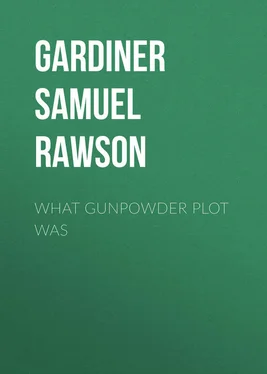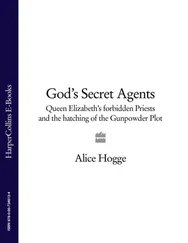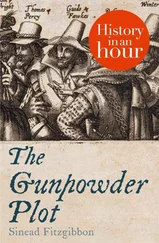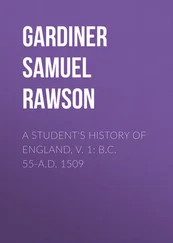Samuel Gardiner - What Gunpowder Plot Was
Здесь есть возможность читать онлайн «Samuel Gardiner - What Gunpowder Plot Was» — ознакомительный отрывок электронной книги совершенно бесплатно, а после прочтения отрывка купить полную версию. В некоторых случаях можно слушать аудио, скачать через торрент в формате fb2 и присутствует краткое содержание. Жанр: foreign_antique, foreign_prose, на английском языке. Описание произведения, (предисловие) а так же отзывы посетителей доступны на портале библиотеки ЛибКат.
- Название:What Gunpowder Plot Was
- Автор:
- Жанр:
- Год:неизвестен
- ISBN:нет данных
- Рейтинг книги:3 / 5. Голосов: 1
-
Избранное:Добавить в избранное
- Отзывы:
-
Ваша оценка:
- 60
- 1
- 2
- 3
- 4
- 5
What Gunpowder Plot Was: краткое содержание, описание и аннотация
Предлагаем к чтению аннотацию, описание, краткое содержание или предисловие (зависит от того, что написал сам автор книги «What Gunpowder Plot Was»). Если вы не нашли необходимую информацию о книге — напишите в комментариях, мы постараемся отыскать её.
What Gunpowder Plot Was — читать онлайн ознакомительный отрывок
Ниже представлен текст книги, разбитый по страницам. Система сохранения места последней прочитанной страницы, позволяет с удобством читать онлайн бесплатно книгу «What Gunpowder Plot Was», без необходимости каждый раз заново искать на чём Вы остановились. Поставьте закладку, и сможете в любой момент перейти на страницу, на которой закончили чтение.
Интервал:
Закладка:
“After, about Easter, he went into the Low Countries (as he before hath declared in his former examination) and that the true purpose of his going over was, lest, being a dangerous man, he should be known and suspected, and in the mean time he left the key of the cellar with Mr. Percy, who, in his absence caused more billets to be laid into the cellar, as in his former examination he confessed, and returned about the end of August, or the beginning of September, and went again to the said house, near to the said cellar, and received the key of the cellar again of one of the five, 57 57 Percy.
and then they brought in five or six barrels of powder more into the cellar, which also they covered with billets, saving four little barrels covered with fagots, and then this examinant went into the country about the end of September.
“It appeareth the powder was in the cellar placed as it was found the 5 of November, when the Lords came to prorogue the Parliament, and sayeth that he returned again to the said house near the cellar on Wednesday the 30 of October.
“ He confesseth he was at the Earl of Montgomery’s marriage, but, as he sayeth, with no intention of evil having a sword about him, and was very near to his Majesty and the Lords there present. 58 58 The words in italics are marked by penstrokes across them for omission.
“Forasmuch as they knew not well how they should come by the person of the Duke Charles, being near London, where they had no forces (if he had not been also blown up) he confesseth that it was resolved among them that, the same day that this detestable act should have been performed, the same day should other of their confederacy have surprised the person of the Lady Elizabeth, and presently have proclaimed her Queen, to which purpose a proclamation was drawn, as well to avow and justify the action, as to have protested against the Union, and in no sort to have meddled with religion therein, and would have protested also against all strangers , and this proclamation should have been made in the name of the Lady Elizabeth.
“Being demanded why they did not surprise the King’s person, and draw him to the effecting of their purpose sayeth that so many must have been acquainted with such an action as it 59 59 ‘With that practice, that,’ in the Stowe copy.
would not have been kept secret.
“He confesseth that if their purpose had taken effect, until they had had power enough, they would not have avowed the deed to be theirs; but if their power (for their defence and safety) had been sufficient, they themselves would then 60 60 ‘Then,’ omitted in the Stowe copy.
have taken it upon them. They meant also to have sent for the prisoners in the Tower to have come to them, of whom particularly they had some consultation.
“He confesseth that the place of rendezvous was in Warwickshire, and that armour was sent thither, but 61 61 ‘But,’ omitted in the Stowe copy.
the particular thereof 62 62 ‘Whereof,’ in the Stowe copy.
he knows not.
“He confesseth that they had consultation for the taking of the Lady Mary into their possession, but knew not how to come by her.
“And confesseth that provision was made by some of the conspiracy of some armour of proof this last summer for this action.
“He confesseth that the powder was bought by the common purse of the confederates.
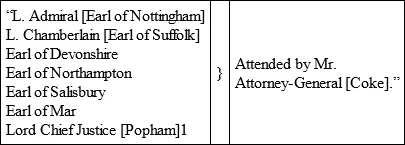
G. P. B. , No. 49. In the Stowe copy the names of the Commissioners are omitted, and a list of fifteen plotters added. As the paper was inclosed in a letter to Edmondes of the 14th, these might easily be added at any date preceding that.
Father Gerard, who has printed this examination in his Appendix, 63 63 Gerard , p. 268.
styles it a draft, placing on the opposite pages the published confession of Guy Fawkes on November 17. That later confession, indeed, though embodying many passages of the earlier one, contains so many new statements, that it is a misapplication of words to speak of the one as the draft of the other. A probable explanation of the similarity is that when Fawkes was re-examined on the 17th, his former confession was produced, and he was required to supplement it with fresh information.
In one sense, indeed, the paper from which the examination of the 8th has been printed both by Father Gerard and myself, may be styled a draft, not of the examination of the 17th, but of a copy forwarded to Edmondes on the 14th. 64 64 Stowe MSS. , 168, fol. 223.
The two passages crossed out and printed above 65 65 Gerard , p. 170.
in italics have been omitted in the copy intended for the ambassadors. All other differences, except those of punctuation, have been given in my notes, and it will be seen that they are merely the changes of a copyist from whom absolute verbal accuracy was not required. Father Gerard, indeed, says that in the original of the so-called draft five paragraphs were ‘ticked off for omission.’ He may be right, but in Winter’s declaration of November 23, every paragraph is marked in the same way, and, at all events, not one of the five paragraphs is omitted in the copy sent to Edmondes.
In any other sense to call this paper a draft is to beg the whole question. What we want to know is whether it was a copy of the rough notes of the examination, signed by Fawkes himself, or a pure invention either of Salisbury or of the seven Commissioners and the Attorney-General. Curiously enough, one of the crossed out passages supplies evidence that the document is a genuine one. The first, indeed, proves nothing either way, and was, perhaps, left out merely because it was thought unwise to allow it to be known that the King had been so carelessly guarded that Percy had been admitted to his presence with a sword by his side. The second contains an intimation that the conspirators did not intend to rely only on a Catholic rising. They expected to have on their side Protestants who disliked the union with Scotland, and who were ready to protest ‘against all strangers,’ that is to say, against all Scots. We can readily understand that Privy Councillors, knowing as they did the line taken by the King in the matter of the union, would be unwilling to spread information of there being in England a Protestant party opposed to the union, not only of sufficient importance to be worth gaining, but so exasperated that even these gunpowder plotters could think it possible to win them to their side. Nor is this all. If it is difficult to conceive that the Commissioners could have allowed such a paragraph to go abroad, it is at least equally difficult to think of their inventing it. We may be sure that if Fawkes had not made the statement, no one of the examiners would ever have committed it to paper at all, and if the document is genuine in this respect, why is it not to be held genuine from beginning to end?
Father Gerard, indeed, objects to this view of the case that the document ‘is unsigned; the list of witnesses is in the same handwriting as the rest, and in no instance is a witness indicated by such a title as he would employ for his signature. Throughout this paper Fawkes is made to speak in the third person, and the names of accomplices to whom he refers are not given.’ 66 66 Gerard , p. 169.
All this is quite true, and unless I am much mistaken, are evidences for the genuineness of the document, not for its fabrication. If Salisbury had wished to palm off an invention of his own as a copy of a true confession by Fawkes, he surely would not have stuck at so small a thing as an alleged copy of the prisoner’s signature, nor is it to be supposed that the original signatures of the Commissioners would appear in what, in my contention, is a copy of a lost original. As for the titles Lord Admiral and Lord Chamberlain being used instead of their signatures, it was in accordance with official usage. A letter, written on January 21, 1604-5, by the Council to the Judges, bears nineteen names at the foot in the place where signatures are ordinarily found. The first six names are given thus: – ‘L. Chancellor, L. Treasurer, L. Admirall, L. Chamberlaine, E. of Northumberland, E. of Worcester.’ 67 67 S. P. Dom. xii. 24.
Fawkes is made to speak in the third person in all the four preceding examinations, three of which bear his autograph signature. That the names of accomplices are not given is exactly what one might expect from a man of his courage. All through the five examinations he refused to break his oath not to reveal a name, except in the case of Percy in which concealment was impossible. It required the horrible torture of the 9th to wring a single name from him.
Интервал:
Закладка:
Похожие книги на «What Gunpowder Plot Was»
Представляем Вашему вниманию похожие книги на «What Gunpowder Plot Was» списком для выбора. Мы отобрали схожую по названию и смыслу литературу в надежде предоставить читателям больше вариантов отыскать новые, интересные, ещё непрочитанные произведения.
Обсуждение, отзывы о книге «What Gunpowder Plot Was» и просто собственные мнения читателей. Оставьте ваши комментарии, напишите, что Вы думаете о произведении, его смысле или главных героях. Укажите что конкретно понравилось, а что нет, и почему Вы так считаете.
